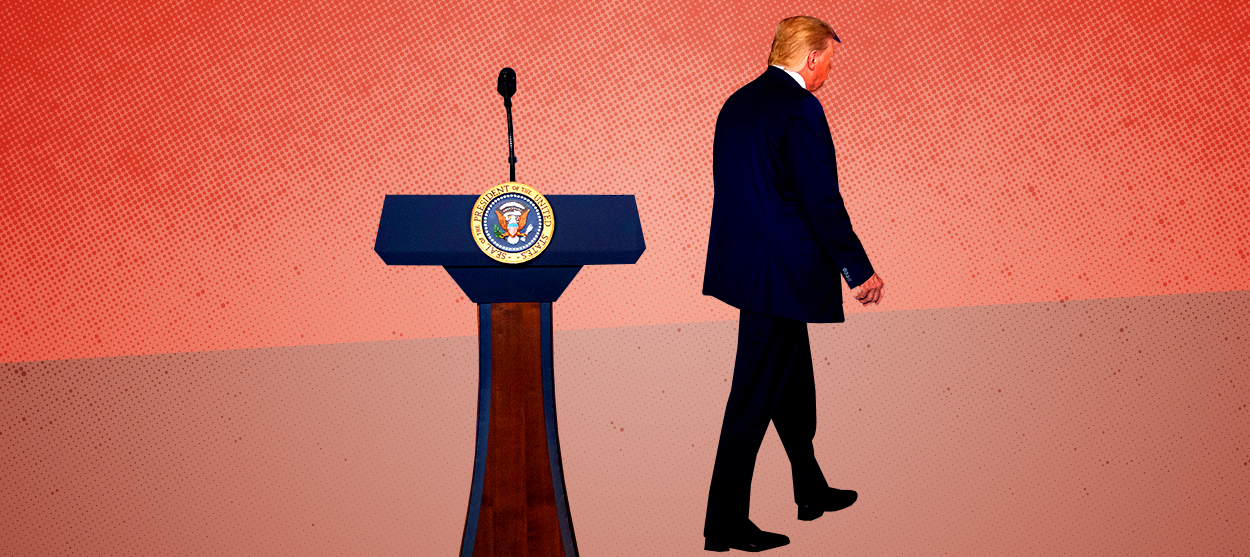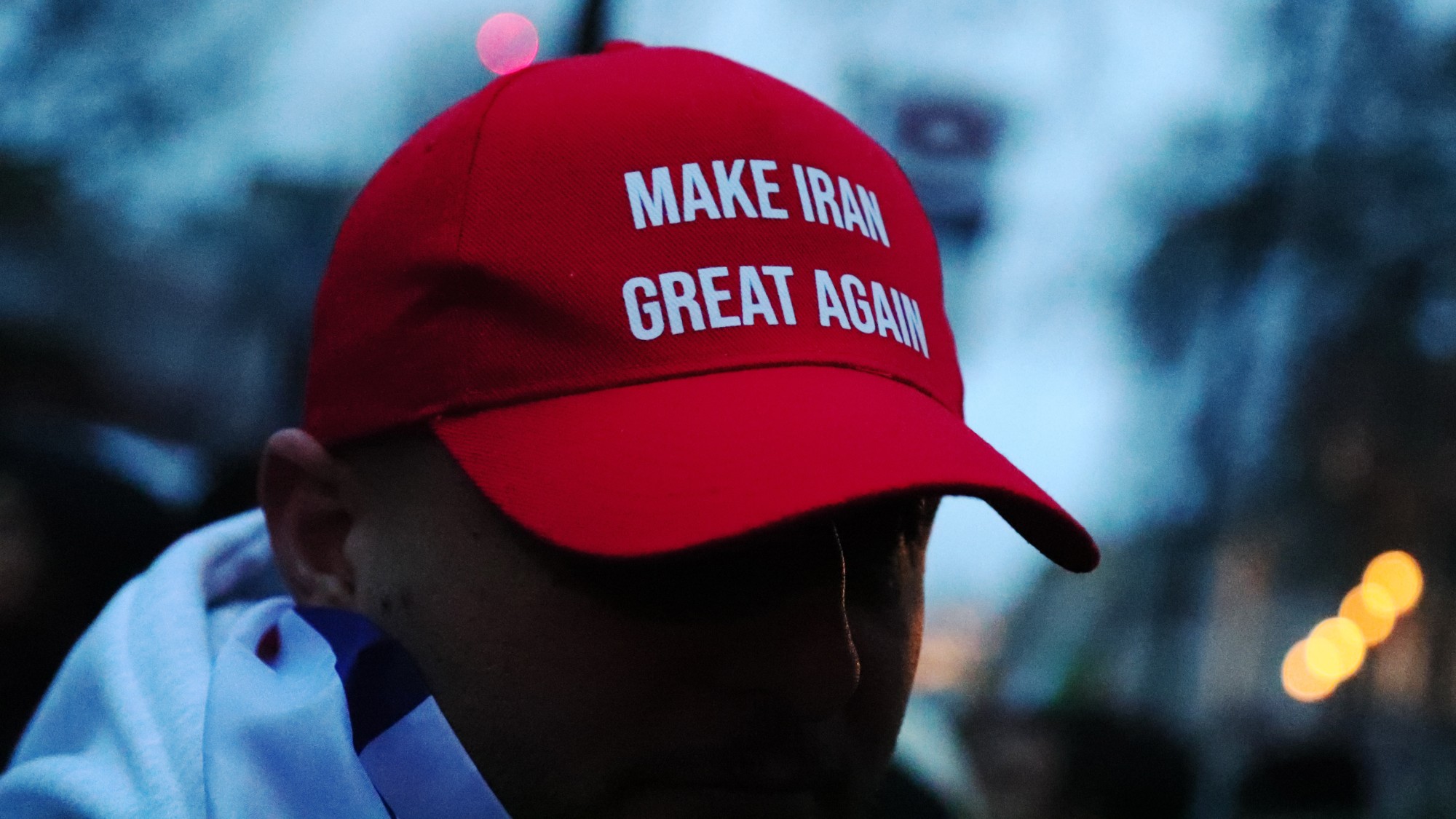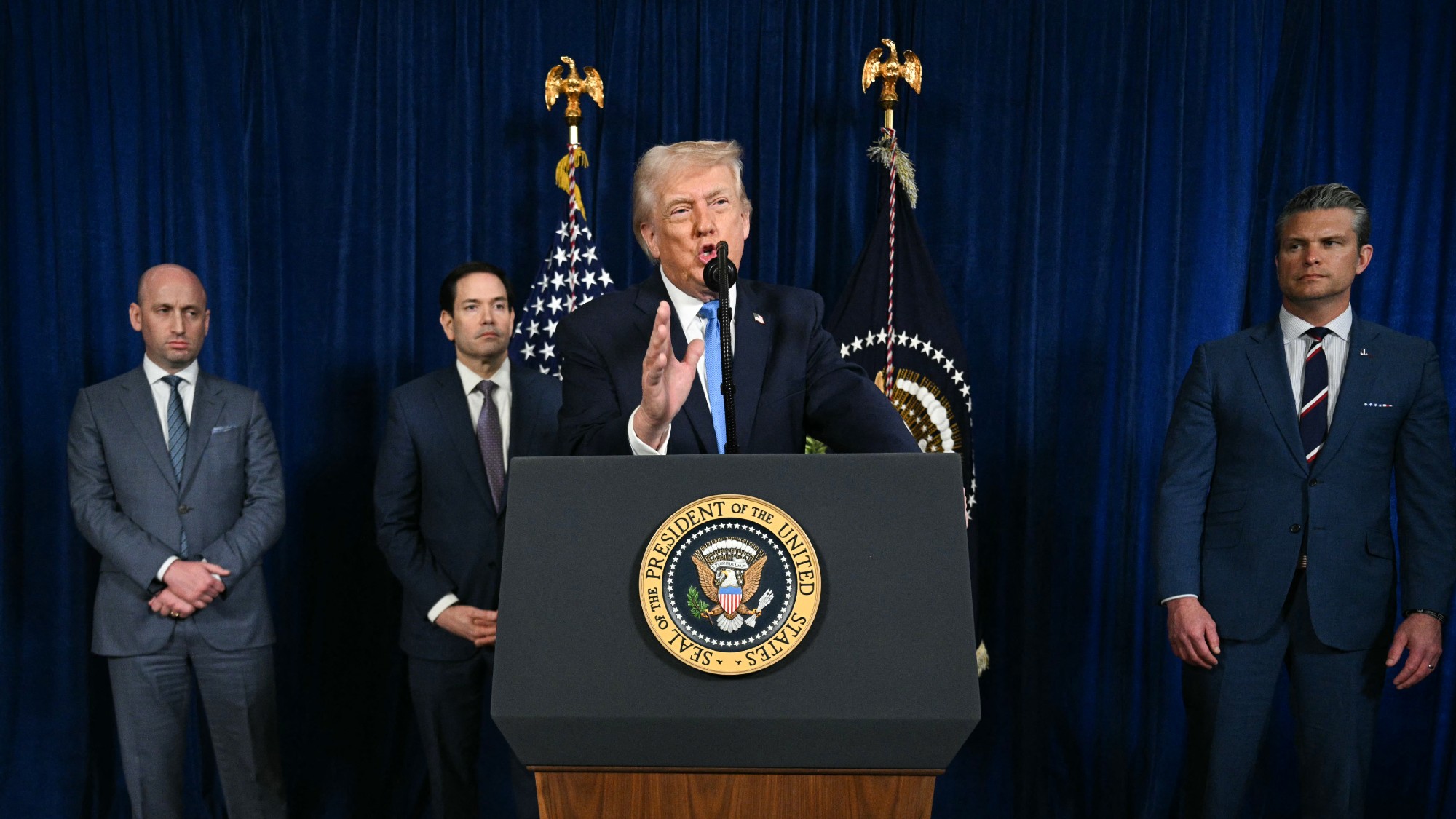There is no good reason to go to war with Iran
Why Trump should end this escalation immediately


A free daily email with the biggest news stories of the day – and the best features from TheWeek.com
You are now subscribed
Your newsletter sign-up was successful
There is still time to make this stop.
On Tuesday night, Iranian forces launched missiles at two U.S. bases in Iraq in response to last week's assassination of Maj. Gen. Qassem Soleimani. The move was the latest escalation of the crisis between America and Iran. Iranian officials followed the attack by signalling a desire to avoid further "escalation or war," but we're still waiting for somebody — anybody — to put the brakes on what appears to be a steady, unavoidable march toward conflict.
But war is avoidable. There is still time for President Trump and his advisers to back away from the precipice of another Middle Eastern conflict. There is still time, for that matter, for Iran's leaders to do the same. There are several reasons they — and we — should step back from the brink.
The Week
Escape your echo chamber. Get the facts behind the news, plus analysis from multiple perspectives.

Sign up for The Week's Free Newsletters
From our morning news briefing to a weekly Good News Newsletter, get the best of The Week delivered directly to your inbox.
From our morning news briefing to a weekly Good News Newsletter, get the best of The Week delivered directly to your inbox.
First, we shouldn't go to war with Iran because we haven't tried hard enough to achieve peace. If there have been any attempts to negotiate the conflict between Iran and the United States, or to reconcile the differences between the two countries, they are not readily apparent. War should be a measure of last resort, used only when all political and diplomatic solutions have been exhausted. Not only have those solutions not been exhausted, they seem not to have been tried at all. Before the United States commits itself to shedding blood abroad, it owes it to its citizens — and the citizens in the countries that will bear the brunt of fighting — to try just a little bit harder to back down. In this case, "trying a little bit harder" means trying at all.
Even if diplomacy had truly been tried and had failed, it isn't at all clear that we actually have any good reason to go to war. The shifting rationales for Soleimani's assassination suggest the Trump administration chose to kill him first and find a good explanation later. The United States and Iran have been headed for a major collision since the Islamic Revolution of 1979 that brought the mullahs to power and resulted in the kidnapping of Americans at the Tehran embassy for 444 days — an event that obsesses Trump to this day. Viewed objectively, both sides can point to one another as the provocateur: Iranians can blame the U.S. for the 1953 coup, for example, or for the more recent "maximum pressure" campaign of sanctions that has created real pain for that country's ordinary citizens; Americans can and do point to Iran's sponsorship of terrorism generally and attacks on U.S. troops in Iraq specifically.
Everybody can come up with a reason the other side started it, in other words. But nobody can offer a good reason why those provocations should end up with a full shooting war right now.
Just because you have a reason to go to war doesn't mean you should. If the American government is going to choose to go to war with Iran at this point, it should be able to articulate what "winning" that war looks like, what price it is willing to pay to achieve those ends, as well as a demonstrated ability to pay that price. We have none of that. Instead, Trump sniffs haughtily at the notion of "exit strategies," while Defense Secretary Mark Esper tells us that while the United States does not want war with Iran, "we are prepared to finish one."
A free daily email with the biggest news stories of the day – and the best features from TheWeek.com
There is no evidence that is true. The United States has entered two major wars since the dawn of the 21st century. We are still mired in both, still killing people and seeing our own people killed, with no end in sight. America is good at defeating regular armies, but terrible at winning insurgencies and "asymmetrical" warfare of the kind Iran is likely to use. If the Trump administration is going to lead us into another war in the Middle East, it owes Americans a reason to believe this time will be different, that there will be an end to hostilities. I don't believe it can plausibly offer that assurance.
Which leads us to the final reason to choose peace: The Trump administration has not earned the trust it needs to lead Americans into battle. The president promised twice this week to commit war crimes in retaliation for any Iranian attacks — and he did so weeks after pardoning American service members for war crimes committed in Iraq and Afghanistan. He currently faces an impeachment trial. His ability to lead this country wisely and unselfishly is very much in question. All of this means he cannot unite the country behind him in order to prosecute a war in Iran. As Conor Friedersdorf wrote this week at The Atlantic, the critiques of Trump "render him less able than many of his predecessors to unite the country, credibly speak for the public, or launch an offensive that a successor will agree to sustain."
These many reasons America should choose to avoid war with Iran correspond pretty closely to the justifications required by "just war" theory. There is good reason to be skeptical that any war can be morally justified, of course, but just war theory at least offers a good reason to pause on the mad rush to battle. There are variants of the theory, but generally wars can only be justified if there is a good cause, if wars are waged as a last resort, if there is a reasonable prospect of winning, and if the war is waged by a just, competent authority.
Right now, the American rationale for war fails on all of these counts. There has been a lot of talk of World War III this week, but players on all sides might focus, for a second, on World War I instead. That war started with an act of terror and then escalated into a long, drawn-out quagmire that killed millions of combatants and civilians. History doesn't have to repeat itself. There is still time to stop this war. But our leaders have to start making the right choices.
Want more essential commentary and analysis like this delivered straight to your inbox? Sign up for The Week's "Today's best articles" newsletter here.
Joel Mathis is a writer with 30 years of newspaper and online journalism experience. His work also regularly appears in National Geographic and The Kansas City Star. His awards include best online commentary at the Online News Association and (twice) at the City and Regional Magazine Association.
-
 The problem with diagnosing profound autism
The problem with diagnosing profound autismThe Explainer Experts are reconsidering the idea of autism as a spectrum, which could impact diagnoses and policy making for the condition
-
 What are the best investments for beginners?
What are the best investments for beginners?The Explainer Stocks and ETFs and bonds, oh my
-
 What to know before filing your own taxes for the first time
What to know before filing your own taxes for the first timethe explainer Tackle this financial milestone with confidence
-
 ‘The mark’s significance is psychological, if that’
‘The mark’s significance is psychological, if that’Instant Opinion Opinion, comment and editorials of the day
-
 ‘My donation felt like a rejection of the day’s politics’
‘My donation felt like a rejection of the day’s politics’Instant Opinion Opinion, comment and editorials of the day
-
 How Iran protest death tolls have been politicised
How Iran protest death tolls have been politicisedIn the Spotlight Regime blames killing of ‘several thousand’ people on foreign actors and uses videos of bodies as ‘psychological warfare’ to scare protesters
-
 ‘It may portend something more ominous’
‘It may portend something more ominous’Instant Opinion Opinion, comment and editorials of the day
-
 What are Donald Trump’s options in Iran?
What are Donald Trump’s options in Iran?Today's Big Question Military strikes? Regime overthrow? Cyberattacks? Sanctions? How can the US help Iranian protesters?
-
 Unrest in Iran: how the latest protests spread like wildfire
Unrest in Iran: how the latest protests spread like wildfireIn the Spotlight Deep-rooted discontent at the country’s ‘entire regime’ and economic concerns have sparked widespread protest far beyond Tehran
-
 The billionaires’ wealth tax: a catastrophe for California?
The billionaires’ wealth tax: a catastrophe for California?Talking Point Peter Thiel and Larry Page preparing to change state residency
-
 What is the Donroe Doctrine?
What is the Donroe Doctrine?The Explainer Donald Trump has taken a 19th century US foreign policy and turbocharged it
